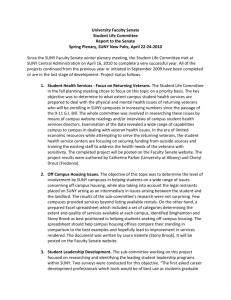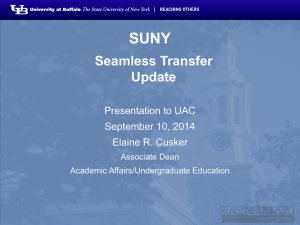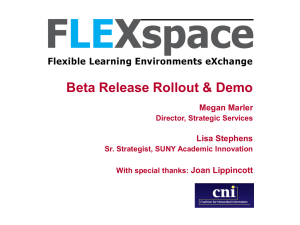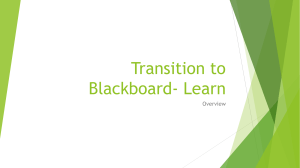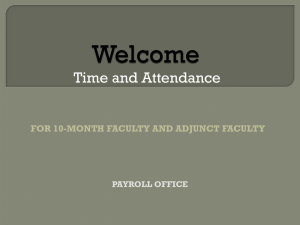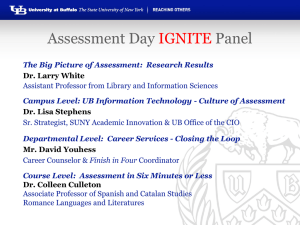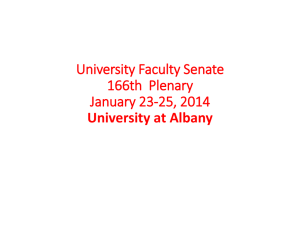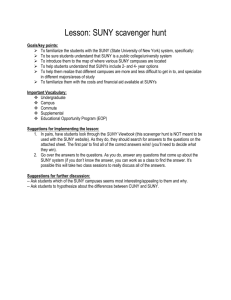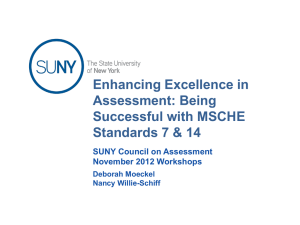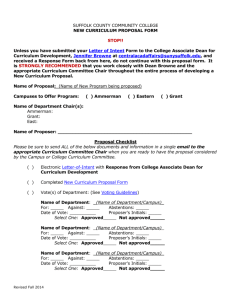Open SUNY – Elements - State University System of Florida
advertisement
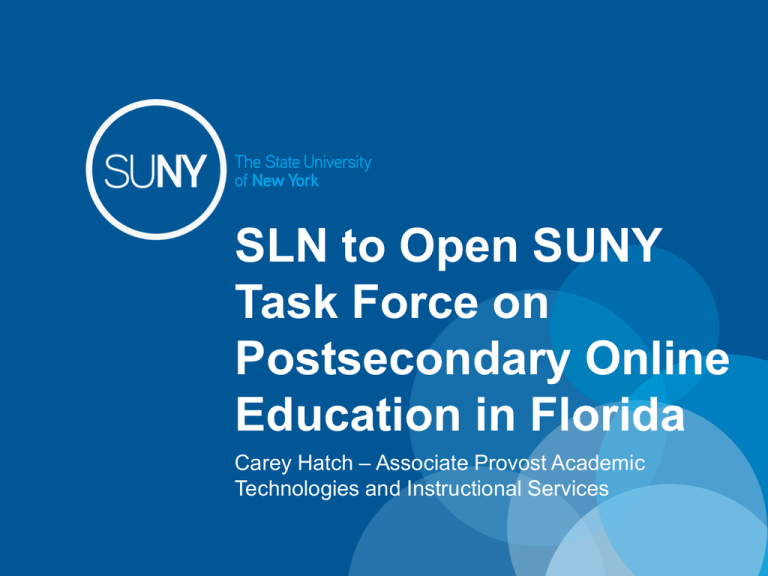
SLN to Open SUNY Task Force on Postsecondary Online Education in Florida Carey Hatch – Associate Provost Academic Technologies and Instructional Services SUNY’s Environment • SUNY is a comprehensive University System – State Operated Institutions Research Centers, Medical Colleges and Hospitals, Other Doctoral Institutions (including 4 Cornell Colleges), Comprehensive Colleges, and Technical Colleges – SUNY also has 30 Community Colleges which are funded differently than state operated colleges. The Community Colleges have more independence – SUNY has a long history of campus autonomy, and is often considered more of a confederation than a system – State support decreased by approximately 30% after 2008 – We can no longer afford to compete against each other – Chancellor Nancy Zimpher has a strategic vision for the University to leverage our system resources more effectively SUNY’s Online Environment • SUNY is a nationally recognized leader in online learning through the SUNY Learning Network (SLN), its partner campuses and Empire State College • SLN began as a Sloan grant funded program located at Empire State College • SLN was moved to the SUNY System Office as more campuses opted to participate SUNY’s Online Environment • System level funding was established to provide incentives for campus to utilize services. Funding currently covers a little less than 50% of the operations – 37 campuses opt in to SLN (ala carte fee for service model) • Faculty and Instructional Design PD • LMS hosting and application support – ANGEL and Blackboard • Helpdesk/Customer Service • Marketing • SLN’s focus has been to support individual campus activities • Empire represents approximately 20% of SUNY’s online offerings but there is little history of Empire and SLN working together SUNY’s Online Environment • We have assets – 12,000 online sections / academic year – 3,800 Gen Ed and 3,400 Pathway’s in the Major course sections (guaranteed transfer) – 201,799 enrollments, 86,487 unique students (AY 1112) – 15,886 students took 80% or more of their instruction online (Fall 2011) SUNY’s Online Environment • Progress vs. Demand – Current online degree offerings is modest for SUNY’s size: • 95 Associate degree programs • 41 Bachelor’s degree programs (28 at Empire State) • 22 Master’s degree programs – Data reports graduates from online associate programs are attending private institutions to continue studies online! Enter the Power of SUNY • Open SUNY – Chancellor Zimpher has called for an expansion of SUNY’s online environment to facilitate student success. – The expansion will be viewed from a collaborative, system perspective, rather than from an individual campus perspective – This will require that SLN evolve to support and encourage collaboration among campuses, while better leveraging campus strengths to the benefit of other institutions – Campuses will need to evolve to collaborate, rather than compete Open SUNY – Elements • Targeted Online Degree Programs – Three year options – Experiential learning opportunities – Prior Learning Assessment Service – Utilization of existing Gen Ed and electives from other SUNY institutions Open SUNY – Elements • Open SUNY Consortium – Financial Aid and cross listing courses • Degree Completion Programs (Empire State) – Find students who have stopped out and encourage them to return • Prior Learning Assessment (Empire State) • Create a service to allow campuses to more easily assess what is appropriate to grant prior learning credits for Open SUNY – Elements • Utilization and creation of MOOCs – Utilizations of MOOCs will be explored for delivery, consumption and PLA • Content/Learning Object Repositories, Discovery tools – Reduce cost of education via open content – Librarians actively engaged Open SUNY – Elements • National & international extension of SUNY Brand • Marketing, Enrollment Management, Student Services • Research Network – A research organization will be established to inform best practices and drive innovation • Online programs to support workforce development Planning and Advisory Progress • University Faculty Senate, Faculty Council of Community Colleges, Academic Vice Presidents, SUNY System Admin. staff and others will be represented on advisory team during implementation • McKinsey Consulting will be assisting with implementation, communication and financial plans Open SUNY – How’s it different • New degree programs will likely be cross-disciplinary across multiple campuses • We may need to save existing, low enrollment programs with cross campus collaborations that rely on online delivery • Our students are already moving throughout the system, we need to make it easier for them to do it where appropriate and for campus support staff to manage the processes that this will require (e.g. systems to facilitate cross registration) • Online offerings and services will be less isolated and will begin to blend the student experience in new ways • Probably less campus autonomy in LMS selection • Possible mandatory payment for enterprise services and infrastructure • Institutional readiness programs to ensure campuses understand what needs to be done (Sloan Scorecard) Discussion
